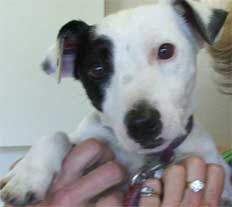Animal Advocates Watchdog
AAS has received many applications for our Jack Russell terrier, Tyke. He has separation anxiety, even after a year in our care. He was kept in a garage for years and he hasn't got over it entirely yet. (We know he will if he is given enough time; they all do if they are not rushed and if they don't sense anger directed at them.)
This is today's application for Tyke:
'I am very interested in adopting this dog. I have a large home with a large yard. We are very familiar with jack russelís as we have both friendís and family memberís who own jack russelís . Any animal coming into our home would be well loved and receive exceptional care and love. I only have two teen children; no young children. We live in Northern, BC however (Prince Rupert). Could you please let me know if you would be willing to allow us to adopt this pet.'
And our answer:
'Thank you for your enquiry, but Tyke has separation anxiety and we have to place him near us so that we can provide ongoing training and support.'
AAS is not treating Tyke any differently than our other dogs; many AAS dogs are the really 'hard ones'. Unlike with humans, all dogs recover if they are given what works; and what works is time combined with love, exercise and security, and some behaviour modification if it helps.
'Time is money' and time is what a 'behaviour test' eliminates the need for. No real dog rescuer uses tests because the outcome is irrelevant. No dog is going to be killed if it were to 'fail',and no dog is going to be rehomed if it 'passes', when common 'dog-sense' tells one that the dog isn't really ready yet.
AAS will not do long-distance adoptions because of our commitment to ongoing responsibility. The only exceptions are where someone we know and trust lives in the area and will do the 'following', and that only for problem-free dogs. This seldom happens though.
AAS has been criticized by other dog rescue persons for having 'too high standards'. We've been told that we could 'do' more dogs if we weren't so demanding, as though the bottom line for rescued dogs is quantity and about 'moving product'. The bottom line for AAS is the same bottom line the dog would choose if it could speak; the same bottom line for each of our rescues that we have for our own pets. It's too easy to let standards slip lower and lower; instead, the longer AAS does dog rescue ,the more we learn about recovery, and the higher our standards get. Killing instant failures is dog disposal. Selling sick or damaged dogs is dog-shuffling, not animal welfare.
Many AAS dogs would immediately fail the SPCA's test and be killed, yet in our care they recover and go on to be happy dogs, loved by someone who is equally happy to have them as a best and loving companion. On the other hand, the SPCA's test is so inaccurate that it 'passes' some dogs that are then sold and go on to bite, sometimes children. No test can equal commitment and experience; no test is needed if there is a commitment to no 'failures'.
Tests are a tool used by the dog disposal industry to cull out dogs that will take time... and time is money.

Messages In This Thread
- "The responsibility is yours" - It's not rescue and its not animal welfare if you don't take responsibility
- The underlying problems associated with overpopulation warrant increased action rather than rationalizing and justifying the necessity of euthanasia
- The issue raised is at the heart of the fight between the BC SPCA and AAS: the SPCA is improving
- The BC SPCA might argue that its policies and practices were the commonly held norms in animal welfare *PIC*
- Taking responsibility: Madalyn Gilmore
- Taking responsibility for Tyke *PIC*
- Taking responsibility for Chuck *PIC*
- The issue raised is at the heart of the fight between the BC SPCA and AAS: the SPCA is improving
- The underlying problems associated with overpopulation warrant increased action rather than rationalizing and justifying the necessity of euthanasia